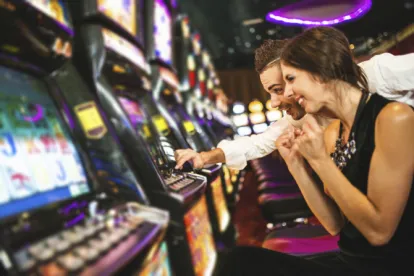From electronic slot machines and casino games to online betting platforms, the gaming industry heavily relies on intellectual property to protect its innovations and graphics, and to prevent competitive copycats. So, what is intellectual property? Intellectual property is a broad description of rights which protect intangible creations, can be owned, and can be enforced against others’ use for a certain period of time. The categories of intellectual property (“IP”) that we will address in this article are patents, trademarks, and copyrights, but there are other categories of IP that will be separately covered, such as trade dress and trade secrets. The gaming industry is increasingly focused on protecting its IP rights in recent years. Most of the major gaming companies own hundreds of patents, copyrights, and trademarks and are continually applying for new IP protections.
So, you want to grow your IP portfolio, but how do you choose what IP protections you should focus on? We’ll show you in this article how you can potentially use three major IP protections in connection with a single game to provide a broad scope of protection.
1. Patents
Behind the allure of flashing lights and the sounds of electronic clinking coins, the underlying mechanics of gambling-based games can involve intricate innovation that can often be protected under patent law. Patents grant the right to exclude others from making, using, offering for sale, importing, or selling the invention in the United States for a limited period of time (about 20 years). Patents can also be licensed to third parties in exchange for royalties, creating a new revenue stream for the owner and developing valuable assets which can be sold, if desired. In the gaming industry, patents may cover innovative hardware, technical solutions, or an inventive method of gameplay.
As one example, U.S. Patent Number 10,600,286, granted in 2020, relates to a slot game called Mighty Cash. It claims an apparatus and method of providing a feature game with repeater symbols. The owner has exclusivity with respect to the game’s inventive apparatus and method. No other company can create a game with the claimed features without infringing the patent.
2. Trademarks
In the gambling world, branding is everything. Casinos, betting platforms, and game developers invest significant resources in establishing a recognizable brand. Trademarks play a pivotal role in this effort. A trademark is a name, logo, or phrase used to identify and distinguish goods or services and to indicate the source of those goods or services. Owners of a trademark can prevent others from using their marks, or marks which are confusingly similar. In the gaming industry, trademarks are powerful protections. Gaming companies often trademark the company name, the name for each game release, and any associated logos.
Continuing the example above, the game Mighty Cash is protected by U.S. Reg. No. 5,107,573 and the Mighty Cash logo is protected by U.S. Reg. No. 5,627,347. Thus, no other company can use the name Mighty Cash, the Mighty Cash logo, or something confusingly similar thereto, for electronic gaming machines.
3. Copyrights
Game graphics, sound effects, music, and software code can be protected by copyright law. Copyright protects the original tangible expression of an idea in the form of a creative work. Copyrights automatically vest once a person has created an original work, but can also be registered federally. Copyrights give the owner the exclusive right to reproduce the work, prepare derivative works, distribute copies of the work, and perform and display the work publicly. Like all of the IP rights discussed herein, copyrights may also be licensed or sold.
Continuing the Mighty Cash example, each of the game’s icons are protectable under copyright law. No other company can display an icon which is substantially similar to the icons used in the game.
Thus, the Mighty Cash game is a good example of a single game that is simultaneously protected by three different types of IP – patent, trademark, and copyright. Each form of IP offers a different scope and duration of protection, giving the owner a significant competitive advantage. From safeguarding brand identity through trademarks and copyrights to fostering inventive gaming mechanics via patents, intellectual property shapes the very fabric of the gaming industry. Consult with your intellectual property attorney for advice on how to further develop your IP portfolio.
Avoiding Infringement of Third-Party IP
As the gaming industry continues to evolve creatively, technologically, and geographically, there has been an increase in IP-related gaming litigation. Infringement occurs when you tread on an owner’s exclusive IP rights, as discussed above. To avoid infringement and costly lawsuits, you should work with a professional to search, analyze and clear the field prior to roll-out of a new game title. Consult with your intellectual property attorney for advice on how to avoid IP infringement.





 />i
/>i
